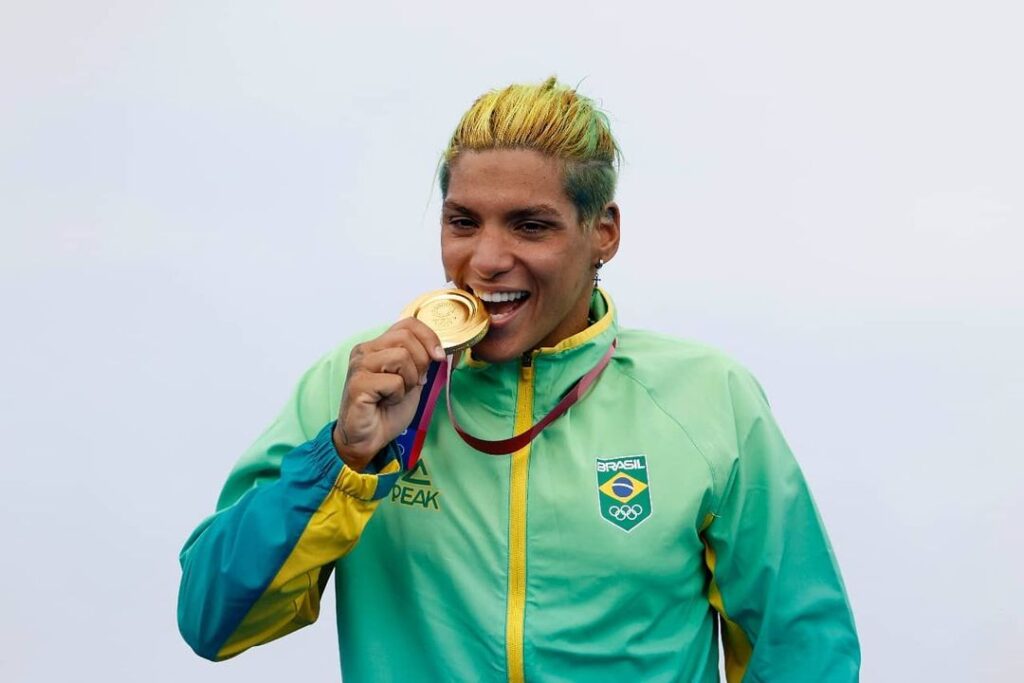The clock is ticking towards the opening of the 2024 Olympics in Paris, France. And as the Olympics approach, concerns remain about whether it is safe for Olympic and Paralympic open water and triathlon swimmers to race in the Seine.
Last month, the current Olympic 10K open water champion, Ana Marcela Cunhawas the last to voice concerns.
Organizers of the Paris Games have committed more than €1 billion (approximately US$1.5 billion) to efforts to clean up the iconic river. But last summer's swim test competition was canceled due to poor water quality, which authorities later said was caused by a faulty upstream sewer valve. Despite this setback, organizers have resisted publicly nominating an alternative venue for the open water event if water quality on the Seine does not meet acceptable levels in August 2024.
In an interview with AFP in Rio de Janeiro's Copacabana, Cunha called for a “Plan B” if this exact situation were to arise.
“If it's not possible to compete there, we need a plan B,” Cunha said. “Organizations have to accept that, perhaps unfortunately, they may not be able to hold the event where they would like, and they have to take care of the health of their athletes, which is the most important thing,” she further explained.
The Seine is at the heart of the organizers' plans. It traverses Paris and is an effective tool to introduce you to the city's most beautiful sights. The opening ceremony is expected to be held on the water. The course of the open water event offers a direct view of the Eiffel Tower.
Cunha recognized what the organizers were trying to achieve with the course. But she rejected the idea that Plan B would erase the city's history. “The history of Paris and the history of the Seine will not disappear (by not holding the race in Paris). We know the value of the Pont Alexandre III, the Eiffel Tower,” she said, adding that athletes He reiterated the importance of health and safety.
Cunha's call follows the president's. Emmanuel Macron Added promise with the Mayor of Paris Ann HidalgoSwimming in the Seine.Both Macron and Hidalgo's promises resonate. Jacques Chirac. In 1990, Chirac vowed to swim in the river while he was mayor of Paris, a promise he never fulfilled. Mr. Hidalgo declared that he would jump before the Olympics, but Mr. Macron evasively said, “I will not reveal the date. There is a risk in participating.''
Organizers' $1 billion plan to clean up the Seine has two main priorities. The goal is to remove the pollution that already exists in the river and to prevent further pollution. This second priority of his is especially important because Paris's sewerage system carries both rainwater and wastewater. According to When a Storm Overwhelms a Star System, this happens about 12 times a year. Samuel Colin Canivesthe city's chief engineer for the cleanup sewage project, all of which will be released into the Seine River.
The storage tanks that Colin Kanib and his team are building underground near Austerlitz station are the main means by which organizers will combat this problem. Once completed, the basin and connected 700-meter tunnel will hold 13.2 million gallons of water.
However, since April 2023, the organizers have invited journalists from the following media: time and new york times To check their progress, they knew that rain could throw off all their plans.Before the convention, he said that if it rained all week, the vice mayor Pierre Rabadin Said new york times “We know that despite all the efforts we've made, the water quality probably won't be great.” No alternative venue has been announced, so we're postponing the race and Retesting is the first option.
Cunha knows that too. “You can’t do anything on the day of the event,” she said. “But then if you get out of the water, you can get sick two weeks later,” she said, adding that it could take weeks to know whether swimming in the Seine had any negative effects on the athletes. She pointed out that it was sexual.
Cunha, a three-time Olympian, is familiar with the pollution that affects Olympic open water competitions. Cunha swam at both the Rio and Tokyo Games. Waterborne viruses were a major concern in Rio. In Tokyo, water quality has become a major issue leading up to the Olympics.

